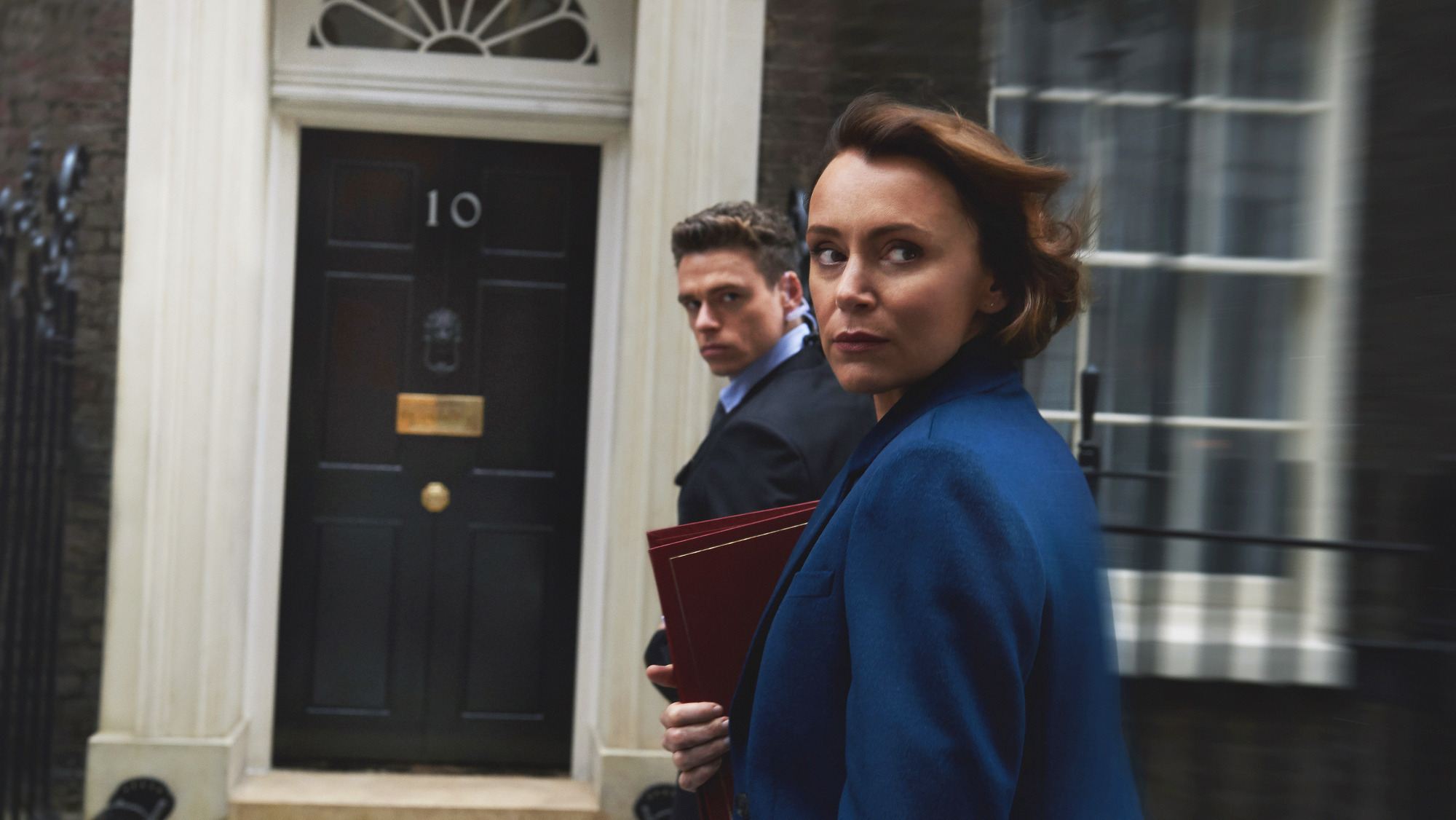Jed Mercurio’s television series BBC Bodyguard has been a runaway hit. The political drama, which features a government grappling with an increased terror threat in the UK, has attracted over seven million viewers during its Sunday evening slot.
It’s not just the political intrigue and gripping action scenes that have pulled us in, though. Bodyguard raises important questions about the tension between national security and our rights to privacy and freedom of expression.
Don’t worry, this is a spoiler free zone.
What’s the story?

Credit: BBC Pictures
Troubled police offer and war veteran David Budd (Richard Madden) is assigned to protect controversial Home Secretary Julia Montague (Keeley Hawes), who is intent on introducing more stringent surveillance and investigatory powers for national security.
The political action centres on Montague’s efforts to introduce a new bill focused on increased state surveillance, the Regulation of Investigatory Powers Act (RIPA 18).
Bodyguard has caught flak from viewers for being unrealistic. Real-life bodyguards who work on personal protection details have pointed out a number of mistakes Budd makes in protecting the Home Secretary while other viewers have taken to Twitter to complain (bizarrely) about the number of women in positions of seniority in politics and in the police and, erm, the fact that the train where Budd confronts the suicide bomber in episode one is scheduled to arrive on time into London Euston.
But there are also parts of the show which hit too close to home. A divided government, a raised threat of domestic terrorism, and heightened security and surveillance are all issues we’ve seen grabbing the headlines recently.
What do we know about the fictional RIPA 18?

David Budd and Home Secretary Julia Montague Credit: BBC Pictures
We don’t know much about the actual content of Julia Montague’s proposed bill, but it’s clear that she believes firmly increased surveillance is the only way to combat, “the greatest threat to our national security since the Cold War.”
It’s likely that the bill will introduce new powers of monitoring and collecting data on internet usage. She asks her parliamentary aides for statistics on internet searches for jihadist propaganda, and during a House of Commons debate, argues the security services need to be able to examine a thousand online accounts in order to find the one that poses a threat.
We also know that she wants it to be applied retrospectively – in a snippet of a television appearance we hear her say that information obtained before it becomes law will be admissible in court.
We’re not after you if you type into your search engine B-O-O-B-S. But we ought to know if you type B-O-M-B.
Home Secretary Julia Montague
Not everyone feels the same. Opponents call it a “Snooper’s Charter” and argue that it infringes civil liberties. In the House of Commons debate, the leader of the opposition criticises the “private lives of millions of law abiding citizens” being made available to security and intelligence agencies.
When she arrives to give a keynote address on the bill, she is met by hundreds of protesters chanting “RIPA 1-8, no police state”.
Sounds familiar

Credit: BBC Pictures
If this sounds familiar, that’s because it is. There is already RIPA legislation in place in the UK, the Regulation of Investigatory Powers Act 2000.
This Act regulates the manner in which public bodies can conduct surveillance and access people’s communication – including, in some circumstances, mass surveillance.
It includes powers to intercept communication (through a wire tap on phones, or reading post or e-mails); bugging houses or vehicles; following individuals; or using undercover officers or informants to obtain information.
Like the show, opponents called it a “Snooper’s Charter”, arguing that it is intrusive and infringes rights of privacy and freedom of expression.
In fact, two weeks ago the Human Rights Court ruled that the UK government’s mass surveillance programmes under RIPA powers – as exposed by whistleblower Edward Snowden – was incompatible with the Article 8 right to private and family life, and the Article 10 right to freedom of expression.
In 2016, Theresa May, who was then the Home Secretary, introduced the Investigatory Powers Act (IPA) into parliament, which expanded the electronic surveillance powers of the intelligence services and the police – including making sweeping powers to retain communications information, including internet browsing history.
Liberty has already succeeded in challenging part of IPA on a rights basis: in April of this year, the High Court held that the retention powers created by the Act was a violation of the right to privacy.
So who is right?
The introduction of new surveillance powers strikes right at the heart of how to balance the rights of privacy and freedom to expression with the needs of the police and intelligence agencies to get information they need in order to prevent or solve crimes.
Supporters of mass surveillance believe that is crucial for states to keep citizens safe. The way in which terrorist or criminal individuals and organisations communicate, plan, and execute actions have changed. Why should we not take advantage of technology to gather valuable intelligence?
The same people will argue that if you have done nothing wrong, you have nothing to fear. In Bodyguard, the Home Secretary agrees: “We’re not after you if you type into your search engine B-O-O-B-S”, she says. “But we ought to know if you type B-O-M-B.”
Campaigners say mass surveillance means we are all treated as criminal suspects, “guilty until proven innocent” – turning the basic principle of our legal system on its head.
But others say that the powers in these acts are so sweeping that the activities of everyone will be able to be accessed, even if they are not under suspicion. They say that this means we are all treated as criminal suspects, “guilty until proven innocent” – turning the basic principle of our legal system on its head.
They would argue that it creates a disturbing culture, where people feel unable to speak out on controversial subjects or feel that they need to alter their behaviour even if they haven’t done anything wrong – and there is evidence that supports those concerns.
They believe it is a dangerous step down the road towards a totalitarian society without privacy or freedom of expression – and we don’t have to look that far back in history to see why that’s important.
Close to home

Credit: BBC Pictures
Bodyguard and RIPA 18 might be fictional, but the problems they address are very real. They are not problems that are going away either.
With every new domestic terrorist attack comes a renewed call for surveillance legislation, and the legal challenges to RIPA and IPA are set to continue.
We know now how Bodyguard ends after last night’s finale – how will it end for us?







